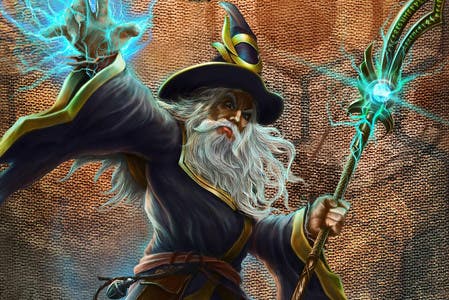Warlock: Master of the Arcane Review
Hexed.
When I was a lot younger than I am now, I had some difficulty getting my head around the idea that a frog could be dangerous. In spite of how tiny and placid they are, my teachers insisted that certain kinds of frog were among the most poisonous creatures in the world, their secretions used to tip the darts of South American Indians. They simply looked very cute and very colourful to me, how could they possibly cause anyone any harm?
Travel through the lands of Warlock: Master of the Arcane and you'll uncover all sorts of creatures that might as well be those South American frogs. They're cute, they're colourful and they're so very deadly to the touch. A new flavour of pain is waiting around every corner and everything is extremely bloody dangerous. First-time players encountering a new monster needn't ask themselves "Do I need to worry about this one, too?" because the answer is always, always "Yes."
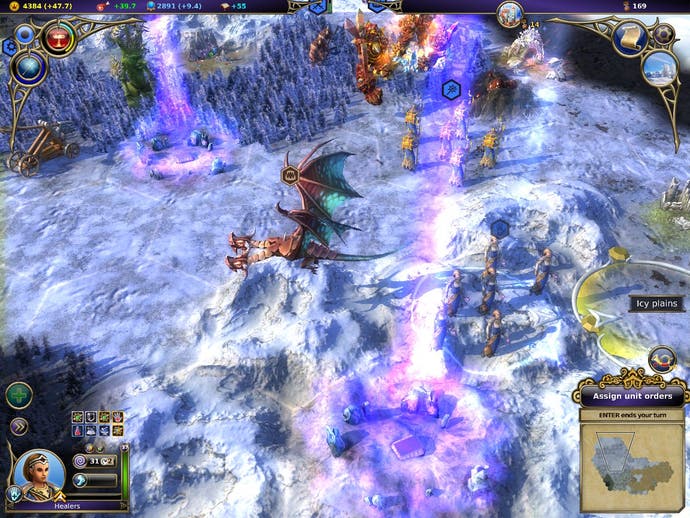
The game goes like this: as a Great Mage, you're somewhere between Dumbledore and a dictator, a powerful spellcaster who lords it over cities, researches new spells, recruits armies and gradually expands your territory. Be the first among your prestidigitating peers to achieve a spectacular feat, such as defeating a God or researching and casting the all-powerful Spell of Unity, and you can consider yourself a success. Alternatively, there's always the option to beat your rivals into submission with the knobbly bit on the end of your staff.
Warlock might look a lot like Civilization 5 with spells, but that would be a lazy and unfair comparison to make. The two certainly share a similar interface and mode of play, but Warlock functions quite differently. It's not interested in your cultural progress or how many trade routes you've opened up. It mostly wants you to kill things and to this end it provides you with an awful, awful lot of things to kill and very many ways to do so.
The vast majority of spells you'll research are for use in combat, tossed down from on high or cast as buffs, while every structure you build in your cities contributes in some way to your war effort. You'll never once have to worry about keeping your population content, because they're all along for the ride too.
Most of your battles won't actually be with other Great Mages, mind. The game is absolutely thick with the most horrifying of indigenous life forms. Take even a few steps outside of your starting city and you find the land patrolled by teams of skeleton archers, haunted by packs of ghost wolves and guarded by great, glowing fire elementals. Any kind of progress and expansion is constantly checked by these creatures, whose strength and tenacity often see you caught up in pitched battles just to secure a few extra hexes of real estate.
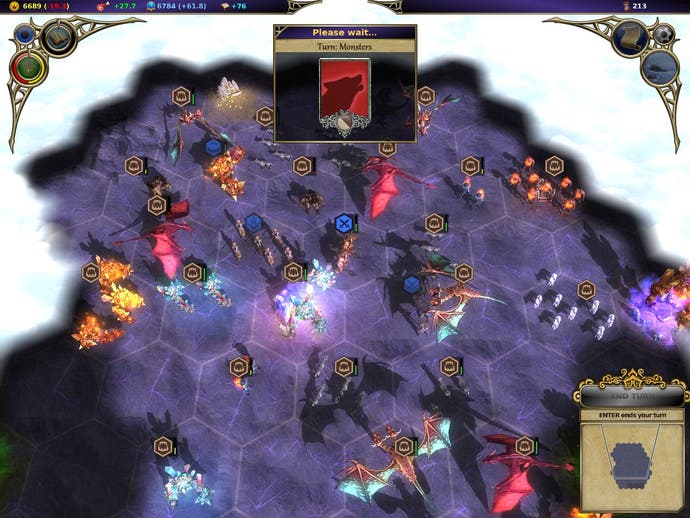
Add to this the fact that in the next hex along there could be almost any kind of monster lying in wait, and it's easy to understand how you might quickly lose your starting units and need to recruit many, many more. It's rarely worth getting attached to most of your troops when certain death at the hands of some new and vastly superior discovery is likely a few turns away.
Clearing out a nearby nest or beating back a particularly powerful foe can require a concerted effort and take many turns, but it's almost always preferable to leaving these things to fester. Nests, caves and demonic portals will keep oozing new units out like infernal cysts until you seal them for good and pretty soon you'll find almost every turn of the game has you sending your armies into combat somewhere on the map. On the higher difficulty levels, the game can become a constant battle against these hordes which will have you thankful that the AI isn't as ruthless in its pursuit as it could be.
Hack your way through this cosmopolitan carnage for long enough and you'll surely find a portal to another realm, a hole in the map that allows you to sidestep into one of the game's other planes of existence. These are even more exotic and dangerous, and arriving on the other side of a portal frequently sees you surrounded with even more bloodthirsty creatures, jealously guarding the precious resources of their alien realm. Found a settlement here and you might enjoy all sorts of otherworldly benefits.
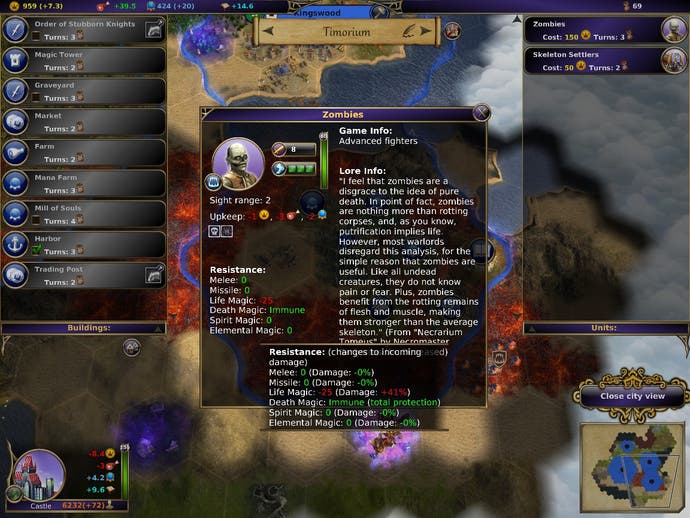
Complimenting the diversity found on the battlefield are a catalogue of unusual buildings to populate your cities with. The most interesting ones can only be built on rare resources and also depend upon the kind of race that make up a city's population, often making for some unusual and interesting combinations. Conquer a few cities of different races and you can soon boast an army even more varied and ridiculous than the kinds of beasts you've been beating down. In one game, the combination of a war college in one city and a flying undead galleon from another allowed me to field university-trained ghost pirates. I was also able to upgrade my werewolves so that they wore hats.
And this is what Warlock is all about. It's really a streamlined 4X game left to simmer, boiled down to a wargame with only trace elements of economy management or diplomacy. Your economy is a pretty stable one, with fixed build times for troops and three resources that you can't tinker with, while your rivals rarely have anything to say to you beyond demanding money or declaring war, and there's no provision for trading spells or units.
"Warlock does a perfectly good job as a tombola of fantasy combat nonsense, full of new and wonderful and silly surprises."
Almost everything is geared towards getting you to make and fight more and bigger units, in as many combinations and permutations as possible, while occasionally tossing in a spell as if seasoning according to taste. Since the AI isn't smart or aggressive enough at higher levels, the difficulty is increased by (of course) having to fight back even more units.
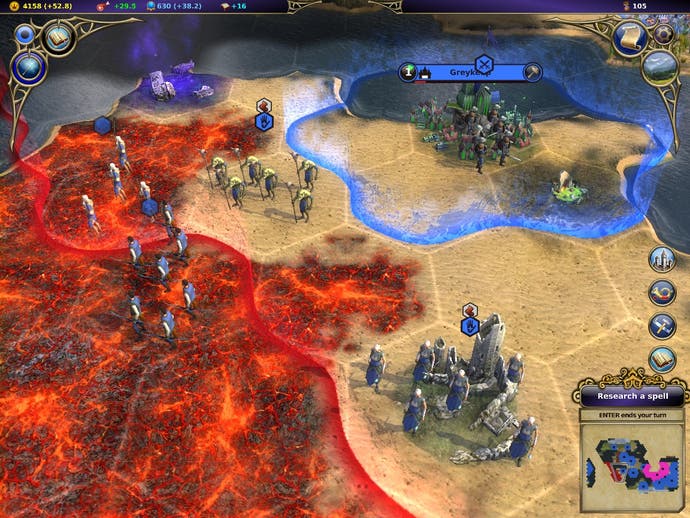
There are a few niggles with the interface, mostly revolving around a lack of detail. If I'm about to research a spell that will let me summon elementals, I wouldn't mind seeing what the stats for those creatures would be. I'd also appreciate an in-game encyclopaedia of spells and a tech tree. Worst of all, there doesn't seem to be any way to destroy buildings once they've been constructed, so should your cities have more farms or markets than you need, you'll never be able to change that. Nevertheless, it all works very well and looks extremely polished
Warlock sits very comfortably in the niche it's created for itself. It's certainly not about to reach out to anyone who doesn't like wargames, nor appeal to anyone who wants the broader scope of the Civilization series, but it does a perfectly good job as a tombola of fantasy combat nonsense, full of new and wonderful and silly surprises. What other game offers you the chance to smack a two-headed dragon upside the head with a giant angry tree?
